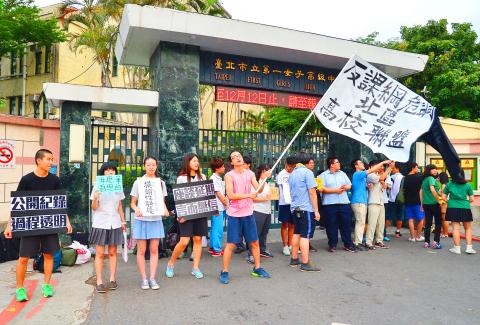Scores of student organizations from various high schools in Taipei staged their first flash protest at the Taipei First Girls’ Senior High School yesterday in the hope of drawing more public attention to the issue of their opposition to the Ministry of Education’s controversial changes to the high-school curriculum guidelines.
Northern Taiwan Anti Curriculum Changes Alliance spokesman Chu Chen (朱震), a student at Taipei Municipal Jianguo High School, criticized the process under which the ministry decided to adjust the high-school curriculum guidelines as overly rash and hasty, saying that even the Taipei High Administrative Court had ruled that the ministry had broken the law.
Chu was referring to the Feb. 12 High Administrative Court ruling that the ministry must make its information more transparent and complete for public scrutiny.

Photo: Wang Yi-sung, Taipei Times.
If the ministry does not change its mind and insists on implementing the changes in August, the students’ demonstrations would continue, Chu said, adding that students would hold talks and seminars, and work with their peers in central and southern Taiwan to organize larger demonstrations next month.
Yesterday’s protest was the first and it was experimental in nature, Municipal Neihu Senior High School second-year student Huang Mao-shan (黃茂善) said, adding that the alliance would be holding flash protests at each school in Taipei to let everyone know the widespread discontent over the ministry’s changes.
Taipei First Girls’ Senior High School was chosen because it is opposite the Presidential Office Building, Huang said.
Minister of Education Wu Se-hwa (吳思華) appeared on the Executive Yuan’s “open microphone” YouTube broadcast last night to explain the guideline adjustments, reiterating that the ministry has decided that both the new and old versions of textbooks would be allowed.
The difference in material between the new and old versions would not be included in the college entrance examinations, Wu said, adding that the ministry was starting an immediate review of the changes.
Students yesterday urged Wu to answer questions about the controversial guidelines “sincerely,” or risk seeing students take to the streets in protest.
The first of the ministry’s planned meetings on campuses for students to communicate with the ministry over the guidelines was held at National Taichung First Senior High School on Tuesday night last week.
It ended with scuffles at the entrance to the campus, when several dozen students stood hand-in-hand to block a car carrying Wu from leaving after the two-hour meeting.
At 8:30pm on Friday, the ministry announced that it was postponing the remaining three hearings.

SECURITY: As China is ‘reshaping’ Hong Kong’s population, Taiwan must raise the eligibility threshold for applications from Hong Kongers, Chiu Chui-cheng said When Hong Kong and Macau citizens apply for residency in Taiwan, it would be under a new category that includes a “national security observation period,” Mainland Affairs Council (MAC) Minister Chiu Chui-cheng (邱垂正) said yesterday. President William Lai (賴清德) on March 13 announced 17 strategies to counter China’s aggression toward Taiwan, including incorporating national security considerations into the review process for residency applications from Hong Kong and Macau citizens. The situation in Hong Kong is constantly changing, Chiu said to media yesterday on the sidelines of the Taipei Technology Run hosted by the Taipei Neihu Technology Park Development Association. With

CARROT AND STICK: While unrelenting in its military threats, China attracted nearly 40,000 Taiwanese to over 400 business events last year Nearly 40,000 Taiwanese last year joined industry events in China, such as conferences and trade fairs, supported by the Chinese government, a study showed yesterday, as Beijing ramps up a charm offensive toward Taipei alongside military pressure. China has long taken a carrot-and-stick approach to Taiwan, threatening it with the prospect of military action while reaching out to those it believes are amenable to Beijing’s point of view. Taiwanese security officials are wary of what they see as Beijing’s influence campaigns to sway public opinion after Taipei and Beijing gradually resumed travel links halted by the COVID-19 pandemic, but the scale of

A US Marine Corps regiment equipped with Naval Strike Missiles (NSM) is set to participate in the upcoming Balikatan 25 exercise in the Luzon Strait, marking the system’s first-ever deployment in the Philippines. US and Philippine officials have separately confirmed that the Navy Marine Expeditionary Ship Interdiction System (NMESIS) — the mobile launch platform for the Naval Strike Missile — would take part in the joint exercise. The missiles are being deployed to “a strategic first island chain chokepoint” in the waters between Taiwan proper and the Philippines, US-based Naval News reported. “The Luzon Strait and Bashi Channel represent a critical access

Pope Francis is be laid to rest on Saturday after lying in state for three days in St Peter’s Basilica, where the faithful are expected to flock to pay their respects to history’s first Latin American pontiff. The cardinals met yesterday in the Vatican’s synod hall to chart the next steps before a conclave begins to choose Francis’ successor, as condolences poured in from around the world. According to current norms, the conclave must begin between May 5 and 10. The cardinals set the funeral for Saturday at 10am in St Peter’s Square, to be celebrated by the dean of the College